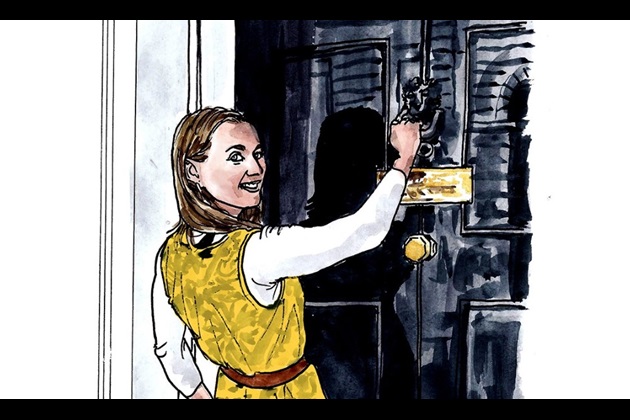Student nurse Amy shares her top tips for meeting and influencing your elected representative
Speaking to an elected representative, like an MP, MSP, AM or MLA, is one of the best ways to get your voice heard by those in government across the four countries of the UK.
Elected representatives have a responsibility to listen to their constituents’ views and you can contact them directly about issues you feel are important.
It also works both ways. Because the person has been elected to represent you, the best way for them to make sure they’re re-elected, is to represent you effectively.
Elected representatives have a responsibility to listen to their constituents’ views
Political influencing is key to any campaign but it’s also a great way to raise local issues or concerns with someone who can influence change.
If you’re able to build up a rapport with your elected representative, they may even come to you for advice on health and care issues. And, the impression you make now could also have a bigger impact in the future if your elected representative goes on to stand in a role where they have a greater say in decisions affecting health policies.
The following tips will help you begin to build a relationship with your elected representative wherever you live in the UK.
Political influencing is key to any campaign but it’s also a great way to raise local issues with someone who can influence change

You can contact your elected representative by email or letter and request a meeting. Email is usually quicker but, either way, make sure you include your own address and postcode because elected representatives are only required to respond to people who live within their constituency.
Make sure you explain how the issue you want to discuss affects you and your local community. It’s useful to state clearly how you’d like them to help. There may be some specific campaign actions you can ask them to take.
Your local RCN office can help by signposting you to templates that you can use for your email or letter.

If you don’t receive a reply, don’t be afraid to follow it up with a phone call to the constituency office. You might also be able to contact your elected representative on social media but make sure you include a link to more information or a request to meet with them.

Try to remember that elected representatives are human and some of the experiences they’ve had might be similar to your own. Even if that isn’t the case, they should be able to empathise with you. They may even have health care workers in their family or friendship groups.
Previously, a lot of my own political involvement has been in grassroots activism and I’ve only recently begun to understand the value in direct political influencing. I used to think “Why would an MP care about me and what I have to say?” But that’s not the case at all. Their job is to represent you.

If you’re meeting an elected representative, be as prepared as possible. Consider what you want to say and do some research on them too. What are they passionate about? What will make them sit up and listen? Sometimes jotting down some agenda points beforehand can help you to stay focused.

Remember, you’re the expert on your own experiences and sharing those with your elected representative is really valuable.
The idea that you need to be completely confident and only make direct points isn’t true. The most powerful thing is your story and your personal experiences so be yourself and use your own words.

If you do arrange a meeting with your elected representative, let your local RCN office know. They can support you if you want them to.
Don’t forget to follow up your meeting with a thank you email or letter. This is also a great opportunity to remind them about what action they agreed to take.

Think about how you can promote your meeting. If you’re on social media, you can tweet about it on the day and ask your elected representative to do the same. You can also ask them if they’re planning to promote it in any other ways, such as including it in their newsletter to constituents.

If you don’t feel able to meet with your elected representative, that’s OK. There are other ways to get involved in political influencing.
A lot of RCN campaigns use online tools which allow you to search for your elected representative by entering your postcode and send them a pre-populated message about a certain issue.
Don’t underestimate the power of this – the more emails they receive about a particular issue, the more they’re likely to take notice.

I firmly believe that you can’t separate nursing and politics. Nursing is a political issue because as nursing staff our livelihood and the care we provide to our patients is vastly affected by the decisions made by government.
So, be politically aware; read the health news and speak to your colleagues. Don’t be afraid to ask for help and advice from others; people are usually willing to share their knowledge.
Whether you’re trying to set up a meeting with an elected representative or taking part in a wider campaign action, the key to influencing is to be persistent.

The RCN isn’t affiliated to any political party and members come from a wide range of backgrounds.
We need to work alongside organisations and individuals who champion our causes to achieve the best deal for members and patients. We also need to talk constructively with people who don’t agree with us.
An elected representative might not agree with you or with the RCN about some issues, but it’s important to be respectful. Consider how you can help change their mind.
More information about elected representatives
The devolved governments of the UK are responsible for health policies in each country. In England, Scotland and Wales, you can speak to your Member of Parliament (MP), Member of Scottish Parliament (MSP) or Assembly Member (AM) about issues relating to health care.
Even though there is currently a political impasse in Northern Ireland, you can still contact your Member of the Legislative Assembly (MLA) to talk about health care issues.
Who represents me?
Lucy's story
A few years ago, news that a contract was being re-tendered was the final straw for Lucy Wright.
Lucy felt so aggrieved by what had happened to her community service over more than a decade, she wrote to her local MP – who was then the Health Secretary Jeremy Hunt...
“I’m a district nurse by background and worked for Virgin Care for five or six years, achieving outstanding ratings for being well led in our Care Quality Commission (CQC) inspections. In April 2017 we were ready to transfer to a new contract – with much less money available – but at the last minute we were told it was a mistake and the contract was being re-tendered.
“When I looked back over the last 15 years, I thought how awfully we’d been treated as a service. The journey we’d been on with procurement, and being employed by different organisations, was challenging. Yet, against all the odds, we were still going. Those who are making the decisions at the top need to know how they affect those of us on the ground, so I decided to write to our local MP, Jeremy Hunt, who was then Health Secretary.
“He invited me to go and see him in his constituency office. I was allotted 15 minutes but actually ended up talking to him for a good 25. I gave him some of the RCN’s postcards about the pay campaign too. He said I seemed angry about what had happened and I agreed. I’ve always felt passionately that community nursing staff, especially district nurses, have so much to offer the NHS. It’s been my fear for the last few years that in the future someone will describe a district nurse, and another person will say ‘oh we used to have them, but they’ve all gone’.
“I asked him to come and visit us and he agreed. By that time, we’d transferred across to the Royal Surrey County Hospital. We had to submit questions beforehand which made the conversation a little stilted, but he listened. I asked if he would come back again in six months’ time.
“But then he changed jobs, becoming the Foreign Secretary. One of his staff contacted us to see if we would still like to see him – we said yes, so he came back again. This time around he had a lot more security, but we didn’t have to submit any questions in advance, so the conversation was much more free-flowing.
“The local RCN officer also came along and we talked about all the various issues facing nursing currently. Throughout, I’ve had really good support from RCN staff and the local RCN rep, who have briefed me on all the issues, helping me develop key messages I wanted to get across. We told Mr Hunt about how wrong we thought it was that the student bursary was going. I did feel he was genuinely listening and I think colleagues felt pleased that they’d been able to voice their concerns.
“I feel proud that I did it and I’d never done anything like it before. Thankfully now things are looking more positive for us – with a longer contract and local investment in our community services. But I hope that when Mr Hunt is sitting in parliament, he remembers some of what I said, and thinks about community nursing and the important role we play in patient care. I hope I raised his awareness of what district nursing can do to help the NHS. I also hope that it encourages the younger generation of nurses to contact their MPs and ask to meet with them.”








